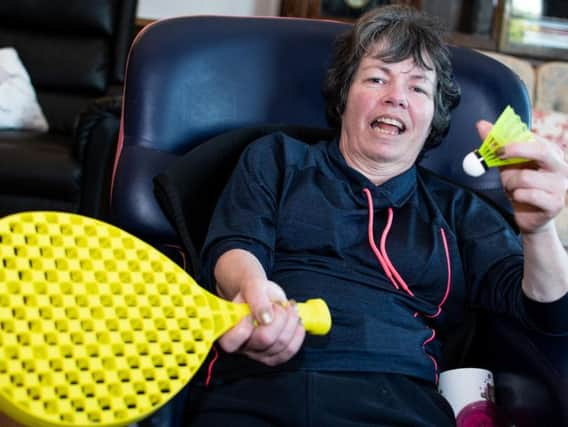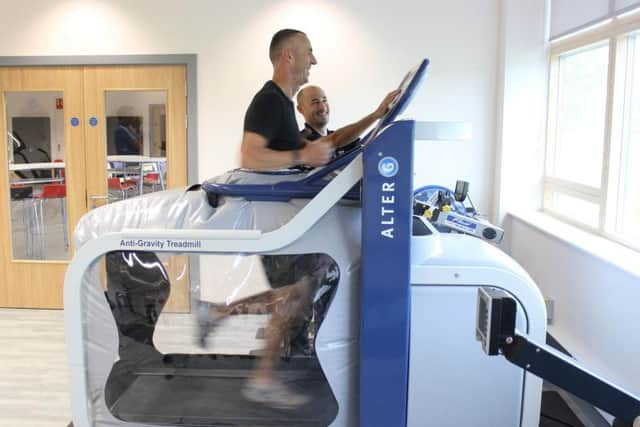Sponsor a Star campaign: Former policewoman tells how Sue Ryder centre is helping her accept her body’s limits


In Nicola Hopkins’ working life, she was a successful career woman and avid sportswoman.
But when her Multiple Sclerosis took a downward turn in 2018, she was forced eventually to move into the Sue Ryder Neurological Care Centre at Cuerden Hall.
Advertisement
Hide AdAdvertisement
Hide Ad“I wish I could go back to what I was,” she says. “I wish I could do all the activities that I used to be able to do.”


For Nicola - who had been a police officer for the Ministry of Defence, did a daredevil parachute jump and has travelled round the Philippines on her own - getting her head around what was happening to her body has taken her to some dark places.
“I thought my time was up in 2011,” the 54-year-old says. “I gave myself medicine. I just wanted to end my life then and there.
“But I climbed back up.
“Sometimes my head gets muddled, I think I can do things that I can’t do or used to do when I was younger.


“I do get down when I can’t do things that I used to do.
Advertisement
Hide AdAdvertisement
Hide Ad“But I came alive when I started playing tennis on the wheelchair. That was good fun, When I play tennis they say, ‘You play like you’ve done this before.’”
By Sponsoring a Star and donating money to buy an anti-gravity treadmill for the new specialist neurological care centre in Fulwood, wellwishers could be helping to enhance Nicola’s life, helping her to find a way to enjoy some of the things that she used to.
Centre director Terry Mears says one of the items on the Christmas wish list for the new centre is an anti-gravity treadmill.
“We’ve looked at anti-gravity running machines,” he says. “It would be so that people who don’t have any mobility and won’t get that back can still experience standing up and the motion of running or walking within this machine. “If you go to the gym and you’ve seen the treadmills - it’s just like that - but there’s a huge balloon round the runner.
Advertisement
Hide AdAdvertisement
Hide Ad“The person is hoisted in and it creates a negative gravity so that they are weightless.
“It means they can actually have that experience.”
He adds: “It’s how we create an opportunity, however limited it may sound, for that person to still have some fulfilment of those wishes, those dreams, those ambitions.”
Asked if she thinks she would enjoy the treadmill Nicola says: “I’m open for anything that improves my standard of living or if it means I can keep doing some of the things I used to do.”
Nicola has left no stone unturned in playing sports. A keen golfer, she had a handicap of 18. She won £150 once playing tenpin bowling. A feisty player, she was kicked out of a rugby game for tripping up another player. She loved driving. She once undertook a 20 mile walk in a day and she’s been to see numerous Formula Ford races.
Advertisement
Hide AdAdvertisement
Hide AdNow playing a bit of tennis from her wheelchair is one of the activities she enjoys. With the hydrotherapy pool and anti-gravity treadmill, Nicola could maybe even look forward to being able to try out other sports.
Nicola’s brother Andrew Pinches, 56, welcomes anything that will mean Nicola can enjoy her life more.
He says: “The MS has taken its toll now. It was so rapid. It was the speed of the downward spiral that was really upsetting.
“Nicola is a strong-willed woman. She’s got a cracking sense of humour and she’s kept that all the way through.
Advertisement
Hide AdAdvertisement
Hide Ad“I think the staff at Sue Ryder are helping her to look forward to what she can do.”
Terry says that despite people’s conditions they still want to enjoy what they were once able to.
“We’ve got one resident who’s been to the Commonwealth Games,” he says. “That ambition, that desire to compete doesn’t stop.”
‘Hydrotherapy pools can help people move again’ Physio Sinead Gallery says that as well as giving people the chance to enjoy things they once did, the pool and anti-gravity treadmill could also help some patients learn to perform the movements again which they might have lost - after a stroke, for example. “From the neuro side we do quite a lot of rehabilitation,” she says. ”We work with them to re-engage the channels so if they’ve had a stroke their brains have been starved of oxygen. “It’s like a train track. You have signals coming up so you might touch something hot and then you have a signal coming down to tell you to move your hand away. “Some brain injuries don’t always have that channel come back down. So we work alongside patients to try and teach the body to build that channel again. “It takes a bit of time bit it mostly comes back for people. So you might see them learning how to hold a cup again. “We do a lot of visual movement with them so we might have a mirror in front of them - being able to visualise it and us doing it with them brings those channels back to them.“The hydrotherapy pool is a massive thing for us. The warmth of the water really does relax the muscles so we can get more movement from them. “Some patients might not be able to stand but we’ll actually be able to get them in the water and standing. It’ll help relax the muscles and help take the pain out of their joints which they wouldn’t be able to do otherwise. “Taking the pain out of the joints is a big thing. Quite a lot of our residents do have quite tight muscles and their joints are quite restricted so it will help and hopefully have a better effect for the therapy treatment. “We also need tilting tables so that patients can stand up in the physio room. It’s a table that you strap them to so they’ve got support at the knees, hips and shoulders so that you can bring them up into the standing position and that actually helps with the respiratory function.”
Advertisement
Hide AdAdvertisement
Hide AdWHAT IS MS?Multiple sclerosis (MS) is a condition that can affect the brain and spinal cord, causing a wide range of potential symptoms, including problems with vision, arm or leg movement, sensation or balance.It’s a lifelong condition that can sometimes cause serious disability, although it can occasionally be mild.In many cases, it’s possible to treat symptoms. Average life expectancy is slightly reduced for people with MS.It’s most commonly diagnosed in people in their 20s and 30s, although it can develop at any age. It’s about two to three times more common in women than men.MS is one of the most common causes of disability in younger adults.The symptoms of MS vary widely from person to person and can affect any part of the body.The main symptoms include:• fatigue• difficulty walking• vision problems, such as blurred vision• problems controlling the bladder• numbness or tingling in different parts of the body• muscle stiffness and spasms• problems with balance and co-ordination• problems with thinking, learning and planningDepending on the type of MS you have, symptoms may come and go in phases or get steadily worse over time.
Christmas Wish List
£370 – will buy a TV for a resident’s room to occupy them in the evening and allow them to catch up on their favourite programmes. TV can enable people to share experiences and stories with others.
£2,000 – will buy a specialist bed and mattress. People with neurological conditions can have restricted movement, so this can enable a resident to sit up, lie down and re-position their legs.
£8,000 – will build an occupational therapy kitchen to help with the rehabilitation for people with complex neurological conditions and acquired brain injuries. This can allow them to regain functional mobility and independence, rather than relying on someone to make them a cup of tea or prepare food.
Advertisement
Hide AdAdvertisement
Hide Ad£14,000 – will buy a specialist bath which promotes a sense of well-being for residents and eases the muscles and relaxes the mind. These baths are accessible for all residents.
£113,000 – will buy hoist tracks and motors to be able to safely move residents with mobility issues from their bed, to their bathroom and into a wheelchair.
£3,000 – will furnish the day service room – a fun and exciting environment for all residents to enjoy and socialise in.
HOW TO DONATEReaders are welcome to donate any amount to the appeal. Anyone who donates £10 or above will have their names included in our Sponsor a Star article in the paper, just before Christmas.To donate, go to www.sueryder.org/ makeadonationOr send a cheque to:Lancashire Post Appeal, Supporter Care, Sue Ryder, 183 Eversholt Street, London NW1 1BU